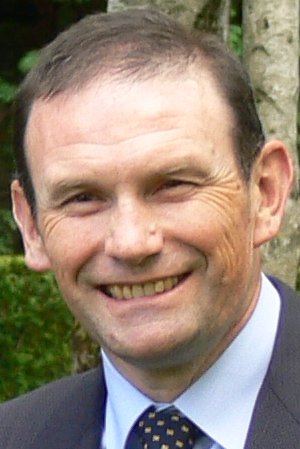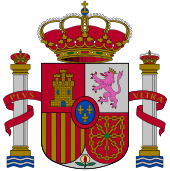
The Goya Awards are Spain's main national annual film awards, commonly referred to as the Academy Awards of Spain.

The Spanish Society of Authors and Publishers is the main collecting society for songwriters, composers and music publishers in Spain. It is similar to AGADU, ASCAP, GEMA, SADAIC, SACEM and SAYCO. The philologist, poet, composer, scriptwriter, movie and television director and producer Antón Reixa (1957) is the Chairman of the Board of Directors since May 2012. SGAE was founded in 1889 as Society of Authors of Spain. In 1995, its name changed to Society of Authors and Publishers, seeking to accommodate cultural editors.
File sharing is the practice of distributing or providing access to digital media, such as computer programs, multimedia, program files, documents or electronic books/magazines. It involves various legal aspects as it is often used to exchange data that is copyrighted or licensed.

The 2008 Spanish general election was held on Sunday, 9 March 2008, to elect the 9th Cortes Generales of the Kingdom of Spain. All 350 seats in the Congress of Deputies were up for election, as well as 208 of 264 seats in the Senate.
This article is about the Internet in Spain.

Law 52/2007, commonly known as Historical Memory Law, recognises and broadens "the rights and establishes measures in favour of those who suffered persecution or violence during the civil war and the dictatorship." It was passed by the Congress of Deputies on 31 October 2007, on the basis of a bill proposed by the PSOE government of Prime Minister José Luis Rodríguez Zapatero. The Historical Memory Law principally recognizes the victims on both sides of the Spanish Civil War, gives rights to the victims and the descendants of victims of the Civil War and of the subsequent dictatorship, and formally condemns the repressions of the Franco regime.
Taringa! is an Argentine-based social networking site geared toward Hispanophone users.

Copyright infringement is the use of works protected by copyright without permission for a usage where such permission is required, thereby infringing certain exclusive rights granted to the copyright holder, such as the right to reproduce, distribute, display or perform the protected work, or to make derivative works. The copyright holder is typically the work's creator, or a publisher or other business to whom copyright has been assigned. Copyright holders routinely invoke legal and technological measures to prevent and penalize copyright infringement.

The 2009 Basque regional election was held on Sunday, 1 March 2009, to elect the 9th Parliament of the Basque Autonomous Community. All 75 seats in the Parliament were up for election. The election was held simultaneously with a regional election in Galicia. It would be the first time that the elections for two of the Spanish "historical regions"—namely, those comprising Andalusia, Catalonia, Galicia and the Basque Country itself—were held simultaneously. This would evolve into an unwritten convention in subsequent years, with Basque and Galician elections being held concurrently in 2012, 2016 and 2020.
The copyright law of New Zealand is covered by the Copyright Act 1994 and subsequent amendments. It is administered by Business Law Policy Unit of the Ministry of Business, Innovation and Employment (MBIE). In June 2017, a review of the existing legislation was announced.

Ángeles González-Sinde Reig is a Spanish scriptwriter, film director and politician. She served as Minister of Culture of the Government of Spain from April 2009 until December 2011. Her appointment was received with anger and rejection by the Spanish Internet Community, due to González-Sinde's opposition to P2P file sharing and the alleged conflict of interest due to her ties to the film industry. A strict anti-piracy law enacted in Spain in December 2011 has become known colloquially as Ley Sinde, or the Sinde Law, as she was seen as the primary backer of the measure.

The 2011 Spanish general election was held on Sunday, 20 November 2011, to elect the 10th Cortes Generales of the Kingdom of Spain. All 350 seats in the Congress of Deputies were up for election, as well as 208 of 266 seats in the Senate. An election had not been due until April 2012 at latest, but a call by Prime Minister José Luis Rodríguez Zapatero for a snap election five months ahead of schedule was announced on 29 July 2011. Zapatero would not be seeking a third term in office, and with political pressure mounting, a deteriorating economic situation and his political project exhausted, an early election was perceived as the only way out.

Elena Salgado Méndez is a Spanish politician of the Spanish Socialist Workers' Party (PSOE) who served as Deputy Prime Minister of Spain and held several ministerial portfolios during her political career.

The Digital Economy Act 2010 is an Act of the Parliament of the United Kingdom. The act addresses media policy issues related to digital media, including copyright infringement, Internet domain names, Channel 4 media content, local radio and video games. Introduced to Parliament by Lord Mandelson on 20 November 2009, it received Royal Assent on 8 April 2010. It came into force two months later, with some exceptions: several sections – 5, 6, 7, 15, 16(1)and 30 to 32 – came into force immediately, whilst others required a statutory instrument before they would come into force. However some provisions have never come into force since the required statutory instruments were never passed by Parliament and considered to be "shelved" by 2014, and other sections were repealed.
Abortion in Spain is legal upon request up to 14 weeks of pregnancy, and at later stages for serious risk to the health of the woman or fetal defects.

The Argentine Governments of Néstor Kirchner and Cristina Fernández de Kirchner had several conflicts with major media groups. Kirchner accused the Clarín Group, La Nación, Perfil, and related media of having promoted their overthrow.

The 2011 Madrilenian regional election was held on Sunday, 22 May 2011, to elect the 9th Assembly of the Community of Madrid. All 129 seats in the Assembly were up for election. The election was held simultaneously with regional elections in twelve other autonomous communities and local elections all throughout Spain.

Simona Levi is a theatre director, playwright, activist, technopolitical strategist, cultural manager and curator, and lecturer. Born in Italy and with Spanish nationality, she has been living in Barcelona, Spain, since 1990. She is an activist in the field of freedom of expression and information, digital rights, the free flow of culture and knowledge, strategic use of digital tools for collective action, institutional accountability, protection of whistleblowers and the fight against corruption and disinformation. She has also participated in movements in defence of the right to housing and use of public space.

Xnet is a non-profit activist platform that develops and promotes alternative models for cultural dissemination and royalty management and work in different fields related to digital rights, networked democracy and freedom of expression. Its activities revolve around five core themes: free culture, Internet neutrality, technopolitics, network democracy, new models of sustainability for the digital era and the defence of citizen journalism and the legal fight against corruption. Xnet also engages in political lobbying at the national and international levels, by preparing and submitting legislative proposals and viral campaigns. Until 2023, Xnet was a member of European Digital Rights (EDRi), a not-for-profit association to promote, protect and uphold civil rights in the field of information and communication technology.
SeriesYonkis is a case in Spanish criminal law. The four former website operators of the site SeriesYonkis, and the sister sites PeliculasYonkis and VideosYonkis, were charged with copyright infringement due to the provision of hyperlinks to cyberlockers where users could access TV series and movies. The defendants faced up to 4 years in prison and over 550 million euros in damages. The case called into question whether the activity of the webmasters constituted an act of communication to the public, following the requirement of the Spanish Criminal Code within the meaning of the Information Society Directive.














